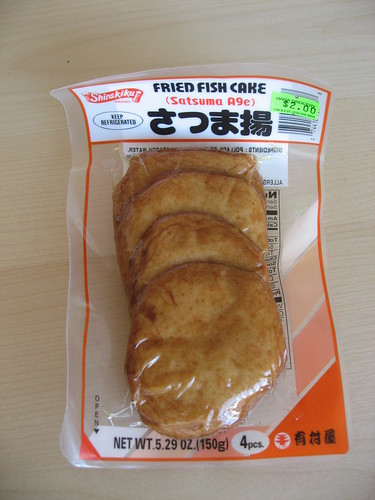For instance, I generally try to avoid buying and eating processed foods, i.e. most things that come in a box at the supermarket. Since reading The Omnivore's Dilemma, I've also been trying to avoid high fructose corn syrup, more to protest the crazy agricultural policies that allow it to be a cheap "filler" ingredient in lots of food products (do we really need HCFS in our sliced bread?) than the admittedly contested claims to it being less healthy and contributing to obesity rates more than other sugars. Yet, what did I end up buying at the Japanese grocery store? Fried fish cakes (processed fish, sorbitol, MSG, tons of things I can't pronounce), instant yakisoba (MSG), and instant Japanese curry (because, you know, it's so hard to find potatoes and carrots in DC...).

And it's not just Japanese food. I've found myself doing the same thing in foreign supermarkets of every variety. Potato chips rarely earn a second glance from me during my meanderings through Safeway. At Tesco in Britain, though, suddenly Thai curry and ketchup and lemongrass make artificially-flavored crisps more palatable. Instant tapioca tea in Chinese markets, boxed chestnut soup in France, and frozen minced pies in London have all tempted me at one point or another.
It seems I'm trying to eschew American fast/ready-made food culture, only to turn around and buy into its "fill in X culture here" counterparts. Clearly part of the attraction is the novelty factor of either seeing somewhat familiar foods in unexpected forms -- whoa, you can make Thai curry into a potato chip?!? -- or unfamiliar foods in familiar forms, as with instant tapioca tea in the same packaging as instant hot chocolate. By extension, it would seem that these supermarket versions of traditional food cultures might then present an easily accessible introduction into unfamiliar food territory. But how, then to balance cosmopolitan tastes with locavore philosophies? Does interest in foreign foods expressed through the more accessible processed food route undermine attempts to preserve traditional food cultures? Or does it help preserve it by maintaining interest in a more accessible form?
Your ketchup crisps remind me of Narayan's comments on curry's journey from India to England. The initial attraction is the other-ness, but then the food has to be co-opted slightly to meet existing market tastes and the result is something that seems foreign but isn't really--a Britishized "curry" sauce or an exotic potato chip.
ReplyDelete